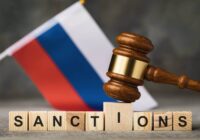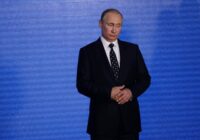The COVID-19 pandemic has certainly made adjustments to the global political processes, delaying several major events. Among them was the introduction of amendments to the Russian Constitution (early voting on which started on June 25, originally scheduled for April 22) that fundamentally alter the internal structure of the country, which, in turn, will affect its international politics. However, these transformations have a deeper context that goes far beyond the borders of the Russian state.
Vladimir Putin Keeps a Tight Grip on Power
The chief architect of Russia’s present-day domestic political system, a close adviser to and former chief of President Vladimir Putin’s administration Vladislav Surkov, launched the process of the country’s ideological modernization considering the tendencies that are changing international relations. The key one is the global trend of the gradual cutting out of speculative liberal elites. In the view from the Kremlin, these liberal concepts of suppressing nation-states and national interests in favor of non-realistic ideas of endless integration, globalism and multiculturalism have collapsed.
The Art of Being Honest
It is noteworthy that leaders of some Western countries, like Germany’s Chancellor Angela Merkel and the former British Prime Minister David Cameron, considered the liberal multicultural vector of development a failure. Anyway, Moscow was the first to understand that the liberal model was unpromising. Returning to realpolitik was by no means a personal desire of Vladimir Putin but a non-alternative solution to preserve the territorial integrity of the country.
The oligarchs, who actually seized power after the collapse of the Soviet Union, treated the state as a business project with the intention to get maximum financial dividends. They did not consider national interests. On the contrary, all resources were aimed at specific tasks: to weaken state institutions of power as much as possible, to demoralize institutions of force and not to let the majority of the population feel like a source of power. This period can hardly even be called “wild capitalism” since the first post-Soviet elites proceeded from the formula that the ends justify the means in its most perverted ways.
The words of Thomas Jefferson, one of America’s prominent Founding Fathers, best describe the two decades of Putin’s rule: “The whole art of government consists in the art of being honest.” It was precisely the element of political honesty that Surkov used as the basis of the ideology of sovereign democracy. This honesty means that Russian people have not achieved the necessary level of civil maturity to make key strategic decisions on their own. Moreover, most of the Russian population still, as was the case in the Russian Empire and in the USSR, wants a strong person to make decisions as people are not ready to take full responsibility for the country’s future. Honesty — as Surkov sees it — also implies that the formation of civil society is inevitable in Russia, but this process should be evolutionary, along with the growth of political literacy. In terms of Russia, this honesty, no matter how cruel it may seem, is expressed in two planes.
The first one is that political culture has not been formed yet. That culture could be a solid basis to carry out fundamental reforms to give the majority of the population total freedom in all spheres of life. If we agree upon the idea that freedom is the highest value we share, then we should also accept that it has to be earned and we have to fight for it. Freedom is a privilege that can be both a cause for progress and a deadly weapon in the hands of greedy forces. The second one is that for objective and subjective reasons most Russians are not ready for diversified institutional management. Therefore, they are still oriented toward a strong ruler who will solve all problems.
Objective Necessity
In addition, Russia occupies one-eighths of the world’s land area, and is multinational and multiconfessional. That is why there is an objective necessity to balance between various control models. Being the main ideological designer of modern Russia, Surkov considers the existing realities and does not perceive freedom as an end in itself. He believes it is a tool to strengthen state immunity, which should be based on the rational coexistence of such categories as “I”, “we” and “ours.”
As the individual’s self-awareness grows, and so does the ability to understand the importance of common interests along with personal ones, Russia will inevitably enter a qualitatively new phase, bypassing blood, wars, disruption, famines and destruction along the lines of the 1917 Revolution and the collapse of the Soviet Union in 1991.
The updated constitution, as implied by Putin and Surkov, should become a kind of roadmap for further state-building in turbulent conditions. The main goal of the proposed constitutional changes is the necessity to strengthen the internal rear. The accelerated pace of internal transformations in Russia is partly related to the American front. The defeat of Donald Trump in the November 2020 US presidential election can greatly complicate the existing crisis situation in relations between Moscow and Washington.
Vladimir Putin rejects any chance for dialogue with the US Democratic elites, seeing them as a constant source of both internal (such as fomenting of the color revolutions) and external (struggle for the post-Soviet space) threats. For him, Joe Biden’s victory means forming a configuration in which Russia needs to be in constant mobilization mode. The reelection of Donald Trump, of course, will not fundamentally alter the nature of interstate relations, but his actions in the international arena are more predictable, and, most importantly, his administration is not concerned about Russia’s internal affairs. Time will tell how successful the process of total integration of the concept of sovereign democracy will be and what renewed Russia will look like.
Global liberal elites are horrified by the thought that Putin and Trump, two realists, could be able to negotiate to remove all problems and agree on the new rules of the game and fair political competition, without interfering in each other’s internal affairs. It is completely obvious that it is the strategic understanding between Moscow and Washington that could determine the geopolitical well-being of all mankind.
*[This piece was updated on Jun6 26, 2020 at 19:50 GMT.]
The views expressed in this article are the author’s own and do not necessarily reflect Fair Observer’s editorial policy.
Support Fair Observer
We rely on your support for our independence, diversity and quality.
For more than 10 years, Fair Observer has been free, fair and independent. No billionaire owns us, no advertisers control us. We are a reader-supported nonprofit. Unlike many other publications, we keep our content free for readers regardless of where they live or whether they can afford to pay. We have no paywalls and no ads.
In the post-truth era of fake news, echo chambers and filter bubbles, we publish a plurality of perspectives from around the world. Anyone can publish with us, but everyone goes through a rigorous editorial process. So, you get fact-checked, well-reasoned content instead of noise.
We publish 2,500+ voices from 90+ countries. We also conduct education and training programs
on subjects ranging from digital media and journalism to writing and critical thinking. This
doesn’t come cheap. Servers, editors, trainers and web developers cost
money.
Please consider supporting us on a regular basis as a recurring donor or a
sustaining member.
Will you support FO’s journalism?
We rely on your support for our independence, diversity and quality.







